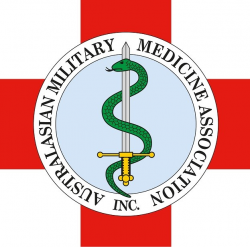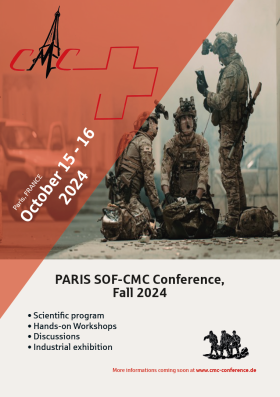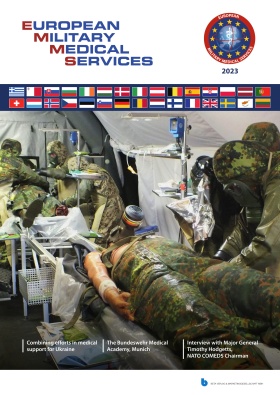
Article: S. GONCHAROV, O. GARMASH (RUSSIAN FEDERATION)
Quality Increase of Emergency Health Care to the Injured is the Top Priority for Disaster Medicine Service of the Russian Federation
“The Fundamental Healthcare Principles and the National Program of Health Development in the Russian Federation define that the priority task of the Russian public health services is to increase the quality of medical care [1]. According to the Fundamental Healthcare Principles in the Russian Federation, Medical care management and delivery in emergencies, including medical evacuation of the injured, are implemented by the All-Russian Service for Disaster Medicine. This article looks at means to increase the quality of health care.”
The main federal regulations and standards Federal law of the Russian Federation of November 21, 2011 #323-F3 “On Fundamental Healthcare Principles in the Russian Federation” and National Program of the Russian Federation “Health Development”, approved by the Decree of the Government of the Russian Federation of 15.04.2014 #294- define that priority task of the Russian public health is to increase quality of medical care [1]. Article 41 of the Federal law of the Russian Federation of November 21, 2011 #323-F3 “On Fundamental Healthcare Principles in the Russian Federation” says: “Medical care management and delivery in emergencies, including medical evacuation of the injured, are implemented by All-Russian Service for Disaster Medicine”. Annually in the Russian Federation, emergencies occur in 75-80 regions and it is necessary to give emergency medical care to more than 30 thousand injured people. Annual relative stable number of the injured and died speaks about necessity of constant increase of the public health preparedness for emergency response [2].
Prep
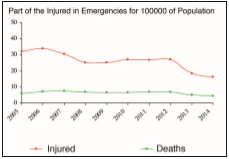
aredness to implement tasks in emergencies is carried out by the permanent improvement of medical institutions every day activity. Operative-dispatching services play a considerable role in it.
The main tasks of Disaster Medicine Service in emergency medical care arrangement and delivery in emergencies are the following: prompt response; mobilization of public health man-power and resources; movement of the Services’ units to emergency zones; arrangement and timely delivery of medical care to the injured; medical evacuation of the injured.
According with the Article 32 of the Federal law of the Russian Federation of November 21, 2011 #323-F3 “On Fundamental Healthcare Principles in the Russian Federation” emergency medical care is given in sudden acute diseases and states, acute exacerbation of a chronic disease, challenging life.
Analysis shows that needs in emergency medical care in everyday life is up to 15% and in emergency response it is more than 60% of all medical care delivered to population. Thus, timeliness (accessibility) and quality of emergency health care are of vital significance.
Considering social significance of emergency medical care, the necessity to provide continuity of all types of emergency medical care delivered to the injured, a Subprogram “ Developmentof emergency medical care, including the specialized one, primary health care in urgent formand specialized medical care in urgent form ” was included in the new version of the National Program “Public Health Development”. In disaster medicine timeliness and accessibility of emergency medical care are ambiguous notions.
In emergencies, such as earthquakes and explosions the injured are in debris of ruined buildings without any access. In these situations the role of emergency rescue units is of vital importance [2].
In everyday life mainly the injured in road accidents and residents of far and difficult of access regions including households need emergency health care.
At emergency site ambulance teams play the main role in giving emergency health care to the injured and their evacuation to the medical institutions. Thus, in 2014 more than 5400 mobile medical teams worked at emergency sites, among them 95% were ambulance teams.
During work in emergency the role of the first medical team which arrives at the accident site is of utmost importance. Head of the team is responsible for medical evacuation in emergency zone and primarily for medical triage and emergency medical care and, according with the requirements of Health Ministry of the Russian Federation, for urgent submitting a report to the dispatcher service of the Territorial Centre for Disaster Medicine.
Variants of work of Disaster Medicine Service’s medical teams (mobile medical teams, field multipurpose hospitals, permanent ready specialized medical teams, etc.) are tested in practice of hundreds and thousands emergency responses, beginning from the military conflict in the North Caucasia.
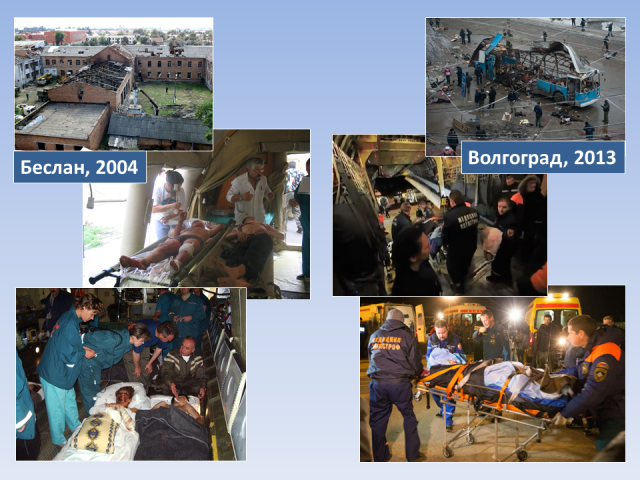 (Pic. Beslan 2004)(Pic.Volgograd 2013)
(Pic. Beslan 2004)(Pic.Volgograd 2013)
To provide emergency health care accessibility and quality for the residents, including those living in the sparsely populated areas and households it is planned to establish or improve existing subdivisions (emergency dispatcher departments)
(working on the base of emergency consultative health careand medical evacuation departments of Territorial Centres for Disaster Medicine) of the Integrated Dispatcher Service of the ExecutiveAuthority of the Russian constituent entity (hereinafter referred to as the Region) in the field of population health care.
Operational-dispatching department of Territorial Centres for Disaster Medicine works round-the-clock, it should be equipped with modern communication facilities, including Internet, providing receiving and exchange of information with all executive bodies of the Russian Federation’s regions, which participate in emergency response; ambulances, medical and local institutions, villages and households.
Operational-dispatcher department should have the following functions: collection and analysis of health information; monitoring of severely injured patients in medical institutions; monitoring of arrangement and delivery of emergency health care, including emergency consultative medical care, to the residents of far and difficult of access regions.
Ministry of Health of the Russian Federation works to provide accessibility of medical care for the population and this work includes, among other things, development of emergency consultative medical care and medical evacuation(air medical service) [3,4,5].
Analysis of the information presented by regions of the Russian Federation showed that development of air medical service demands sufficient number of modern aircrafts, equipped with special medical modules; available helicopter landing sites and runways; well-developed infrastructure for efficient operation and maintenance; necessary financial conditions for air companies- aircraft operators and introduction of long-term national contracts with air companies for the term exceeding expiration dateof approved limits of budget commitments.
While developing air medical service it is advisable to use experience of the regions of the Russian Federation efficiently introducing mechanisms of public-private partnership [6, 7, 8].
Cooperation of national health care authorities of Leningrad region and St. Petersburg with the Limited Liability Company “Helidrive” can serve as an example of such partnership, when the following tasks are solved:
- arrangement of medical air evacuation of the injured in road accidents;
- transportation of the patients to the megalopolis hospitals, equipped with the helicopter landing sites;
- arrangement of interhospital evacuationto the specialized medical institutions;
- delivery of medical mobile specialized consultativeteams to other regions;
- transportation of transplantation organs and donated blood to the special medical institutions equipped with helicopter landing sites.
At the expense of “Helidrive” company helicopter landing sites were built for inter-district medical institutions of Leningrad region, light helicopters with medical equipment were bought and round the clock dispatcher service was organized.
The first experience has already showed that development of air medical service on the basis of public-private partnership will reduce aircraft operating and maintenance costs.
References
| 1. | Федеральный закон Российской Федерации от 21 ноября 2011 г. №323-ФЗ«Об основах охраны здоровья граждан в Российской Федерации». Federal law of the Russian Federation of November 21, 2011 №323-F3“On Fundamental Healthcare Principles in the Russian Federation”. |
| 2. | Гармаш О.А. Аналитический обзор медико-санитарных последствий чрезвычайных ситуаций в Российской Федерации // Всероссийскому центру медицины катастроф «Защита» Минздрава России – 20 лет: Сборник научных трудов / Под общ. ред. акад. РАМН С.Ф.Гончарова. М.: ФГБУ «ВЦМК «Защита», 2013. С. 76–88. Garmash O. Analytical review of emergency health after-effects in the Russian Federation. //Collected papers: 20 years to All-Russian Centre for Disaster Medicine “Zaschita” , Ministry of Public Health/ Under general editorship of Academician S. Gonchrov. M. ARCDM “Zaschita”, 2013. P. 76-88. |
| 3. | Струк Ю.В., Банин И.Н., Воробьев И.И. Организация оказания экстренной специализированной хирургической медицинской помощи на территории Воронежской области: достижения и проблемы// Медицина катастроф. – 2014.-№ 2. - C.37-39. Struk Y., Banin I., Vorobiov I., Arrangement of emergency specialized surgical medical care delivery on the territory of Voronezh region: achievements and problems// Disaster medicine – 2014-№2 pp37-39. |
| 4. | Сотников В.А., Олесов И.И., Герасимов Э.А., Аргунова П.С. Оказание экстренной санитарно-авиационной помощи в Республике Саха (Якутия): состояние и перспективы// Медицина катастроф. – 2014.-№ 2. - C. 41-45. Sotnikov V., Olesov I., Gerasimov E. Argunova P. Emergency air medical care in the Republic of Sakha (Yakutia): state and prospects// Disaster Medicine -2014.-№2-pp 41-45. |
| 5. | Антонюк Г.В., Кирсанов А.И., Дворский А.Г., Золотарева В.И. Работа отделения экстренной консультативной медицинской помощи в составе центра медицины катастроф Республики Крым// Медицина катастроф. – 2015.-№ 1. - C. 48-49. Antonyuk G., Kirsanov A., Dvorsky A., Zolotarieva V. Work of department of emergency consultative medical care in the Centre for Disaster Medicine of the Republic of Crimea.//Disaster Medicine-2015.-№1-pp 48-49. |
| 6. | Попов В.П., Кашеварова Л.Р. Совершенствование системы санитарной авиации в Свердловской области.//Медицина катастроф. – 2015.-№ 1. - C. 43-45. Popov V., Kashevarova L., Development of air medical service in Sverdlovsk region//Disaster Medicine-2015-№1 –pp 43-45. |
| 7. | Сотников В.А., Олесов И.И. Реализация Пилотного проекта «Развитие системы санитарной авиации в субъекте Российской Федерации на 2013-2014 гг.» в Республике Саха (Якутия).// Медицина катастроф. – 2015.-№ 1. - C. 45-48. Sotnikov V., Olesov I. Realization of pilot project “Development of air medical service in the constituent entity of the Russian Federation for 2013-2014 in the Republic of Sakha (Yaukutia) // Disaster Medicine-2015-№1 –pp 45-48. |
| 8. | Банин И.Н., Воробьёв И.И., Балабаев Г.А. Эффективность реализации пилотного проектапо развитию санитарной авиации воронежской области: успехи и проблемы.//Материалы–й межведомственной научно-практической конференции «Санитарная авиация России и медицинская эвакуация». – Тверь: ООО «Издательство «Триада», 2015. С. 22-24. Banin I., Vorobyov I., Balabaev G.Efficiency of pilot project implementation of air medical service development in Voronezh region:Progress and problems// Materials of interdepartmental scientific-practical conference “Air medical service of Russia and medical evacuation”/. Tver: OOO “Publishing house “Triada”, 2015. pp 22-24. |
Date: 09/09/2015
Source: MCIF 3/15






